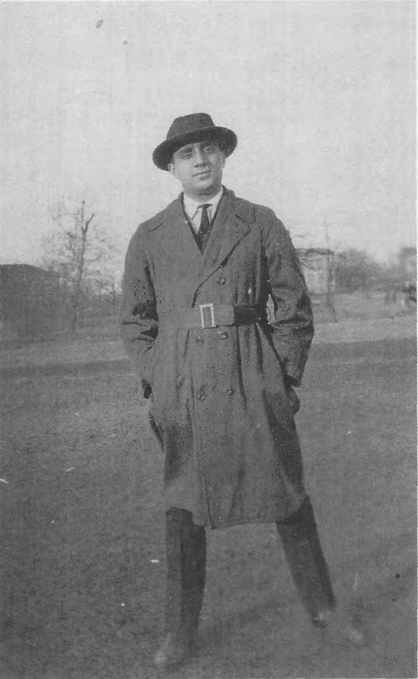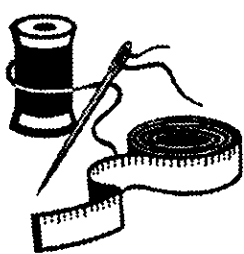Main Body
Chapter 5. Grandpa Dies and Father’s Plan For Our Education Develops
The following year, we lost Grandpa Romanelli. He suffered a massive stroke in May of 1918. He was spared a long illness. He was seventy-six when he died. Mother lost a doting father. Father lost an understanding father-in-law and helper, and we children lost a guardian, mentor, and above all, a friend! Father, I believe, voiced Grandpa’s best and most appreciative tribute when he said, “He was there for us whenever we needed him for any chore or errand. We shall miss him most for taking such good care of you boys. To him belongs much of the credit for how the four of you have turned out.”
The family experienced a great lift in June of 1918 when brother Nick, graduated from Central High School. Mother and father were so proud, father especially so. Having come from an educated family in Italy, he was determined that his sons should also have all the advantages of an education. He was doubly proud, because Nick, by this time, had indicated that he also wanted to go on to college and to Medical school.
Father was a man proud of his heritage and of the family name. This pride also extended to given names. For him, Nicola, my older brother had become Nicholas or Nick more easily. For him, they were logical translations into the English language. He could see no similar logic in the change of Mario Saverio to Solly or Sol! Later, I, Eduardo, became Edward or Eddie or Ed, and younger brother Arturo, became Arthur or Art just as easily, because father recognized those names also as logical English translations. Mario Saverio became Solly when Grandpa enrolled him at school. Grandpa had always insisted on the use of Saverio for his namesake. As a result when asked what Saverio might be in English, he came up with Solly, I suspect because one of the Motto boys who also had been baptized Saverio was called Solly.

Father also had a strong sense of family values, ethics, honesty, honor, and morality. He was able to inculcate those precepts and mold them into each of us, not only by his own example, but also quite eloquently, sometimes by some properly chosen words or by a mere look that was more effective than words! He never preached or harangued or bullied us when he disciplined us. He also had a sense of humor and often used humor, resorting to funny stories when instructing us, often purposely incorporating malapropisms in his stories to convey a point.
His strong pride in our family name was exhibited, not only by his strong desire to protect and insure its correct spelling, as he had shown when being processed through Ellis Island, but also extended to his determination to protect and insure that the family name not be dishonored in any way ever! His admonition to each of us early in life on that score was, “My father has passed on to me the D’Alessandro name unblemished and untainted by scandal of any kind. I am passing it on to you in the same way. It is your responsibility to make sure that the name is passed on to your children in that way also!”
As children, we spent our formative years in a tenement in that area in downtown Cleveland that was originally know as the “Hay Market” and “Big Italy,” and finally “The Roaring Third,” because by that time, it had become the “Third Ward” in the political redistricting of the city. It was dubbed “The Roaring Third,” because it had become the high crime district of the city. Many of the original settlers had moved out of the area to the east and west sides of the city. A great number of the Italian families had moved out to the Murray Hill area, which was known as “Little Italy,” to Collinwood and the West 69″ and Detroit Street areas of the city. They had fled the old neighborhood, because bootleggers, prostitutes, toughs, and other unsavory characters had moved in.
Father had chosen to keep his family in the block on Race Street, because it was within walking distance of the source of his livelihood and because he felt certain that the block on Race Street was a safe island in the changing neighborhood. He also felt certain that we would be unaffected and untouched by the new element as long as we continued to be law abiding members of the community and minded our own business. He was proven right!
I can recall a time when I was about ten years old, we were visited by Signor Motto and hearing him say to my father, “Why do you continue living here? Are you not worried that your sons might be influenced by all this evil that surrounds them?” I have not forgotten my father’s answer. He replied. “Bad fruit comes from a bad tree and good fruit comes from a good tree. I am not worried about how my children will turn out!”
In June of the year 1924, brother Nick, received his Bachelor of Science degree from John Carroll University and was accepted by St. Louis University School of Medicine. This was another high point in father’s life. Like his father before him, he too had plans for the futures of his children! His father’s goal had been to make tradesmen and or business men of his sons. Father’s aim was to see that his sons received the best possible education in whatever field they might choose. When Nick decided that his field was to be Medicine, father, from that moment on not only encouraged Nick to work toward that goal, but also persuaded Mike Lavin to assign more of the formal tailoring work to him in order to increase his income so that he would be better able to help with the cost of medical school.
My brother Sol, who was seventeen by this time, having taken printing at East Technical High School, had just joined Walter Horn, an enterprising young man, who had just started a small shop in a rented room in the Erie Building, located at the corner of East Ninth and Prospect Avenue. This was the forerunner of what in later years became well known as the Horn & Norris Lithograph Company.
In that day, working teenagers, living at home, contributed to the family exchequer. Therefore, the making of Doctor Nick was to become a familiar affair! Nick of course worked during summer vacations. During his first two years of medical school, he worked as a playground instructor at the Eagle Elementary School Playground and during his last two years, got factory work, spending one summer in the steel mills in the Flats to increase his earnings to meet the increasing costs of medical school. Even I, although too young to work, because I was only eleven years old at the time, did my part. Since father and brother Sol, were busy working to support the family and to provide the funds for Nick’s tuition, books, lab fees, living expenses, etc., father assigned to me the job of letter writer. Yes, for the four years that Nick was away in St. Louis studying medicine, I wrote the weekly letters to him, serving as the family scribe!

